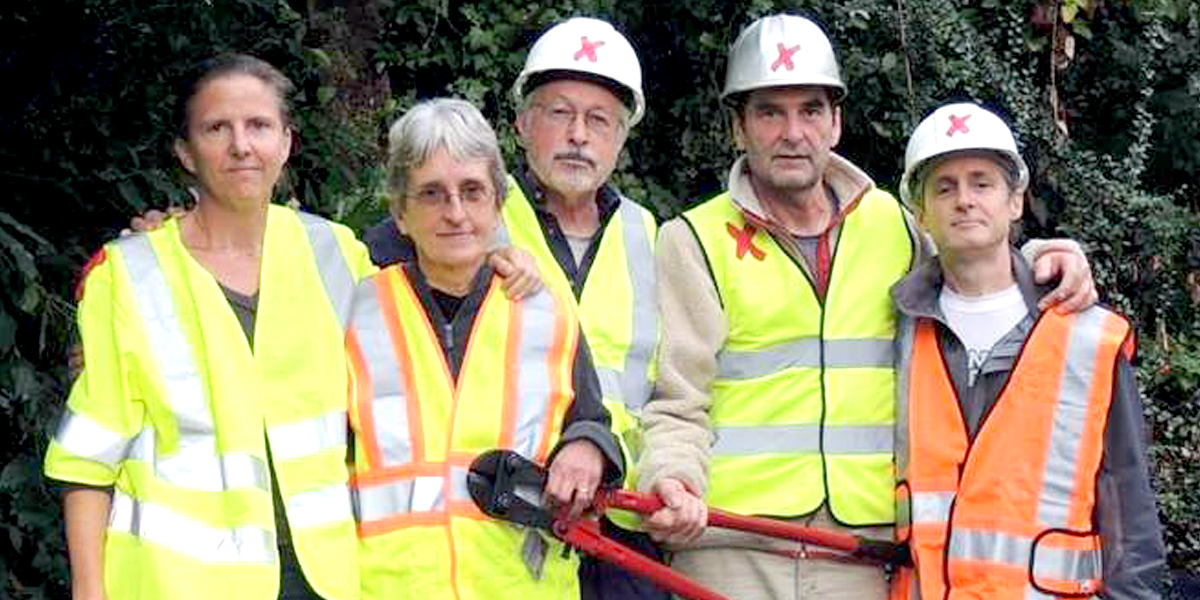
I May Be Facing Felony Charges, But the Real Radicals Are Running the Fossil Fuel Companies

By Emily Johnston
I’ve been thinking a lot about risk lately—what we’re willing to risk and why. I was one of five activists who turned off the major tar sands pipelines coming into the U.S. on Oct. 11, 2016. As a result, I’m risking prison time, ostensibly for property damage (we cut a few chains to access the valves), but really for being disobedient to business as usual. It’s also possible they’ll file a restitution suit, for temporarily disrupting a pipeline that’s highly profitable for some, at the expense of all others.
I took part in the action in full awareness of these risks—in dread of them, to some degree—because of the risk that Enbridge and the other companies engaged in the extraction, transport and sale of tar sands are taking, which is the unimaginably huge risk that if the world’s scientists are correct, what really flows through those pipelines is the end of human history.
[vimeo https://vimeo.com/187580141 expand=1]
Does this seem like crazy talk to you? Does it seem obvious that we can’t possibly move past fossil fuels, no matter what the risks? What are you risking in order not to try, in order to preserve your belief that the world—or at least your world—is basically okay and you don’t need to pay attention to the dire warnings scientists have been giving us?
Last December in Paris, nearly early every nation in the world, including petro-states like Russia and Saudi Arabia, agreed to an aspirational goal of no more than 1.5 C of warming. But it’s very aspirational—right now, even if every nation adheres scrupulously to the Paris agreement (and Donald Trump promises that the U.S. won’t), scientists say that will only “limit” us to 3.5 C.
That’s one of the better scenarios available to us right now—and it risks human extinction. It would make food systems and most other current ecosystems collapse. The reliable seasons that allow human civilization would disappear.
The Paris agreement has 1.5 C of warming as its goal because above that, we can expect worldwide catastrophe: droughts, famines, terrifying sea level rise. A recent report tallied how much fossil fuel we can burn and preserve even a 50/50 chance of staying below that threshold: 353 gigatons of carbon. So even if you’re willing to accept odds worse than you’d have in Russian roulette, you can still only burn well under half of the 942 gigatons in existing mines and wells. To limit ourselves to that and still be able to use fossil fuels for a few essential purposes in coming decades, we have to shut down the dirtiest fuels immediately—including tar sands, which means confronting companies like Enbridge and Exxon.
They’re certainly managing their risks. After Exxon‘s senior scientists started raising internal alarms about climate change in the 1970s, Exxon also raised its ocean-based drilling platforms, because it knew sea levels would rise. Meanwhile, its executives lied to the public and funded disinformation campaigns.
https://twitter.com/EcoWatch/status/725330456439185409
In 1978, a senior scientist told the company, “present thinking holds that man has a time window of 5-10 years before the need for hard decisions regarding changes in energy.” Forty years later, thanks to their lies, we’re still refusing to make those hard decisions. We’re not even close to accepting a 353-gigaton limit. No one in power is even talking about it.
Yet if we don’t radically reduce our fossil fuel use in the next few years, one day soon—no one knows precisely when—we may pass the point where we lose all hope of a stable world. Antarctica is almost certainly in a state of collapse, as is Greenland, bizarre weather caused by climate change is already affecting millions, the Great Barrier Reef has been devastated and on and on. The tipping point of Antarctic melt has likely already been reached, but the tipping point of Arctic methane may not have been. Scientists have been warning of these dangers for many years and with real urgency for the last few. This does not come easily to them; their training predisposes them to understatement. But between understated scientists, arrogant executives, beholden politicians and an anxious population going about its daily business, we’re running devastating risks.
Stunning Photos Show Huge Crack in Antarctic Ice Shelf https://t.co/Pc1i7H0daP @WRIClimate @CarbonFixIt
— EcoWatch (@EcoWatch) December 16, 2016
“The need for hard decisions regarding energy.” What are we willing to risk to avoid that, to convince ourselves the world is basically okay, so we can continue business as usual? Are we really willing to risk our kids? Everyone else’s kids? The millions of blameless people already struggling with droughts and floods? Half the species of the world? It seems that we are.
It seems utterly crazy to me, and to all of the smart, reasonable scientists and policy wonks I’ve spoken with, to take such risks. As Bill McKibben has said for years, the real radicals are running the fossil fuel companies—apparently they think it’s okay to play dice with every life on the planet.
If we don’t agree, we have to move to clean renewables and we have to do it more ambitiously than we’ve ever done anything. We have to pressure the political system now, in every peaceful and inspiring way that we can, because we are coming to this fight very, very late. We have to start acting like people who have everything to lose. Because we do.
Reposted with permission from our media associate AlterNet.

 233k
233k  41k
41k  Subscribe
Subscribe 